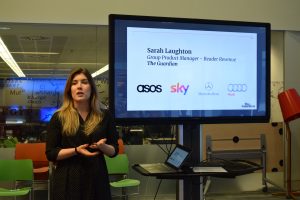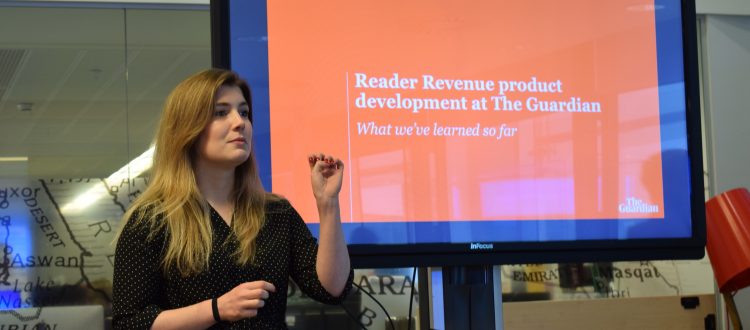The Guardian: Open and independent journalism on reader revenue
Joanne Kuai
22, February 2019 | London

The Guardian’s 10+ cross-disciplinary product teams use data and insight, product frameworks, objectives & key results (OKRs) and design thinking principles to drive revenue outcomes, says Sarah Laughton, Group Product Manager of Reader Revenue at the Guardian.
Ms Laughton was speaking at the Product Development and Design Thinking Summit, which took place in London 21-22 February 2019. She shared the challenges they’ve encountered and the solutions they’ve found, particularly for their reader revenue products.
The lead for the reader revenue strategy says one lesson they’ve learned is to start by asking people to support your purpose and then you can add to and evolve the proposition. Secondly, you need a good pitch, and you can then develop the pitch through continuous research and testing. Thirdly, you need appropriate placement for your appeals, and the Guardian’s appeals belong alongside their journalism.
The Guardian, without a paywall, has now larger reader revenues than advertising revenues. The growing global presence helps the publisher gained a broader supporter base, and the revenue making seems to be in a virtuous circle already.
Ms Laughton says that that while in 2015 more than 70% of the supporters were in the UK, but in 2018, 70% of the supports come from outside of the UK. Among them, the biggest single contribution came from the US, followed by Austria. Germany has the highest single monthly contribution, while the highest average monthly contribution comes from Thailand.
One Million Milestone

Ms Laughton also shares that in November 2018, the Guardian reached a one million milestone – 600,000 single contributions, 230,000 print and digital subscribers, and 340,000 members and recurring contributions. And the newspaper is on course to break even by end-March, in line with a three-year plan to return the publisher to stability.
“Many people didn’t know the challenging commercial reality facing all news media, but once we told them more, they showed real interest in wanting to support the Guardian,” she said.
Dozens of participants from different media organisations all over the world gathered at the headquarters of the BBC in Portland Place in London to listen to Ms Laughton’s talk at the summit. As part of the 9th Data & AI for Media Week, the event aims to inspire participants to imagine how to earn revenue with AI-driven products for their own media companies.
The Data & AI for Media Week was created by World Newsmedia Network in 2013. Since then, the conference has been held in London five times, Hong Kong once and twice in New York. The 10th Data & AI for Media Week is planned for San Francisco and Silicon Valley for 29 April to 3 May 2019. https://sanfrancisco.dataaimedia.org/


